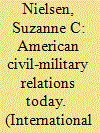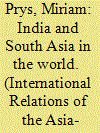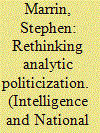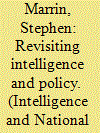|
|
|
Sort Order |
|
|
|
Items / Page
|
|
|
|
|
|
|
| Srl | Item |
| 1 |
ID:
111918


|
|
|
|
|
| Publication |
2012.
|
| Summary/Abstract |
Fifty-five years after it was first published, Samuel Huntington's The soldier and the state remains an essential starting point for serious discussions of American civil-military relations. In part this is due to the boldness and ambition of the author. Huntington brought theory to a research area that had suffered from too little theorizing and then went on to formulate concepts that scholars and practitioners of civil-military relations still find useful. These include: the conceptualization of the military as a profession; the articulation of the two central forces shaping the nature of military institutions as the functional and the societal imperatives; and the formulation of subjective and objective control as the two main patterns of civilian control. This review article briefly revisits these concepts and argues that they retain utility in illuminating important issues in American civil-military relations today. It also argues, however, that Huntington's contributions were productive but not perfect. Some of his specific definitions, such as the content of military expertise, are debatable. Some of his central concerns, such as whether the United States could sustain a strong military over an extended period of time, are no longer central today. Finally, in some places the literature has moved beyond what Huntington offered. The best example is the ongoing debate over how the country's political leaders and its most senior military officers should interact. It is precisely on this point that Huntington's objective control is the weakest. While The soldier and the state certainly does not deserve uncritical acceptance, it does continue to merit a fair hearing. Current discussions of American civil-military relations are likely to be more reasonable and productive if Huntington is given a voice.
|
|
|
|
|
|
|
|
|
|
|
|
|
|
|
|
| 2 |
ID:
103728


|
|
|
|
|
| Publication |
2011.
|
| Summary/Abstract |
In the process of globalization it is border culture that ultimately sustains linkages, assures continuity and maintains prosperity between bounded states. In this essay we explore how border culture works, and how the conceptualization of border culture advances our understanding of how borders work. Our approach is to establish a place for the consideration of culture in the more extensive debates about border theory through a focus on the Canada-U.S. border, and how this border advances our knowledge of border culture and border theory.
|
|
|
|
|
|
|
|
|
|
|
|
|
|
|
|
| 3 |
ID:
120165


|
|
|
|
|
| Publication |
2013.
|
| Summary/Abstract |
The IR literature on hegemony rarely combines attention to material power and ideas. Cox's neo-Gramscian work is a rare exception, but it too narrowly construes Gramsci's conceptualization of common sense, reducing it to elite views on political economy. But Gramsci argued that hegemony had to reckon with mass quotidian common sense. If political elites do not take into account the taken-for-granted world of the masses, elite ideological projects would likely founder against daily practices of resistance. In this article, I show how mass common sense can be an obstacle to an elite hegemonic project aimed at moving a great power into the core of the world capitalist economy. In contemporary Russia, a ruling elite with a neoliberal project is being thwarted daily by a mass common sense that has little affinity with democratic market capitalism. Scholarly work on future Chinese, Brazilian, or Indian participation in constructing a new hegemonic order would do well to pay attention to the mass common senses prevailing in those societies
|
|
|
|
|
|
|
|
|
|
|
|
|
|
|
|
| 4 |
ID:
154243


|
|
|
| 5 |
ID:
105243


|
|
|
|
|
| Publication |
2011.
|
| Summary/Abstract |
In the wake of the Cold War, democracy has gained the status of a mantra. Yet there is no consensus about how to conceptualize and measure regimes such that meaningful comparisons can be made through time and across countries. In this prescriptive article, we argue for a new approach to conceptualization and measurement. We first review some of the weaknesses among traditional approaches. We then lay out our approach, which may be characterized as historical, multidimensional, disaggregated, and transparent. We end by reviewing some of the payoffs such an approach might bring to the study of democracy.
|
|
|
|
|
|
|
|
|
|
|
|
|
|
|
|
| 6 |
ID:
118176


|
|
|
|
|
| Publication |
2012.
|
| Summary/Abstract |
Audience costs are a central feature of many prominent theories of international conflict. We advance the understanding of audience costs by specifying the domestic institutions necessary to generate them. In our conceptualization, audience cost capacity (ACC) is a function of the availability of alternative rulers and the cost of mobilizing against the incumbent. This conceptualization leads to the first measure of ACC that has variation between more and less democratic political systems and variation within autocracies. We subject our measure to a rigorous set of tests that includes addressing selection effects and temporal treatment effects, neither of which have been fully examined in this research area. The empirical analysis offers strong support for the validity of our measure.
|
|
|
|
|
|
|
|
|
|
|
|
|
|
|
|
| 7 |
ID:
108534


|
|
|
|
|
| Publication |
2011.
|
| Summary/Abstract |
For the past 15 years, the concept of human security has been promoted as a significant extension of traditional security studies. However, while human security
has been present and visible in academic and practitioner discourse, it is yet truly
to capture the imagination of specialists. Partly this is a result of the belligerent
direction global politics has taken in the new millennium. Partly, however, it results
from conceptual inadequacies internal to the notion itself. This article confronts
the latter problem. It first examines the emergence of human security within the
wider security studies literature, homes in on debates about human security, and
draws important parallels between development and human security. It then
builds on this to restate human security as freedom from fear and freedom from
want, and to demonstrate how this conceptualization can be understood as a dual
responsibility initially to protect and subsequently to provide. It finally considers
whether a responsibility to intervene is generated by this approach. The brief conclusion summarizes the argument that this conceptualization generates a fresh
way forward for human security studies.
|
|
|
|
|
|
|
|
|
|
|
|
|
|
|
|
| 8 |
ID:
119487


|
|
|
|
|
| Publication |
2013.
|
| Summary/Abstract |
Regions and the regional powers that characterize them stand in multiple inter-relations with the world system. Yet, theories of International Relations struggle with the conceptualization of this global-regional nexus. This article introduces an analytical tool that allows for the evaluation of the 'embeddedness' of regions into the international system and its consequences for a regional power in 'its' region. The theoretical tool shows in particular that regional powers do not necessarily have an inherent interest in 'their' region and its stabilization or, in general, the provision of public goods. Instead, global interests can prevail. Thus, the decision to engage positively in the region is one that does not automatically follow from relative preponderance as it is assumed by many analysts of regional powerhood in the case study chosen here, South Asia, and across the globe. The applicability of this analytical tool is illustrated with the help of two specific examples - India's conflict management in Sri Lanka and its role in the democratization process in Nepal.
|
|
|
|
|
|
|
|
|
|
|
|
|
|
|
|
| 9 |
ID:
118367


|
|
|
|
|
| Publication |
2013.
|
| Summary/Abstract |
Politicization as a term used in intelligence studies is poorly defined, conceptualized and operationalized. Despite the negative connotations associated with the word politicization that equate it with a form of corruption, it is not entirely clear what it is a corruption of. In short, the concept of politicization is for the most part analytically useless. This article critiques the existing status quo conceptualization for being overly broad and insufficiently nuanced, explores the nature of analytic politicization as a subset of politicization writ large, and replaces it with a narrower conceptualization that explains what makes analytic politicization bad and deserving of condemnation. Based on this evaluation, one can conclude that much of what is considered to be politicization in a corrupted sense is really just a naturally-occurring consequence of analysis and interpretation in a policy or political context.
|
|
|
|
|
|
|
|
|
|
|
|
|
|
|
|
| 10 |
ID:
118365


|
|
|
|
|
| Publication |
2013.
|
| Summary/Abstract |
The relationship between intelligence and policy has its ups and downs. Sometimes the relationship is a good one; communication flows and both sides benefit from the interaction. The optimal outcome entails the use of accurate intelligence analysis to improve decision-making. But sometimes difficulties arise and problems develop. For example, when knowledge is required for decision but is not available or is inaccurate the outcome is frequently described as an intelligence failure. A subset of this kind of intelligence failure occurs when knowledge is distorted in order to reinforce or oppose policymaker preferences or expectations. Another less successful outcome occurs when good, accurate knowledge is not used to improve policy, but is instead set aside or ignored by those who have the responsibility and obligation to make decisions. This set of articles explores the difficulties that can arise in the relationship between intelligence and policy.
|
|
|
|
|
|
|
|
|
|
|
|
|
|
|
|
| 11 |
ID:
152812


|
|
|
|
|
| Summary/Abstract |
Peace researchers have recently started to develop datasets that allow distinguishing between different levels of interstate peace. In this article, I first argue that existing conceptualizations and measurements suffer—to varying degrees—from two major specification problems: on the one hand, they face problems of what I call “ontological underload,” as they do not include all essential constitutive dimensions. On the other hand, they face problems of “ontological overload,” as they integrate factors as endogenous dimensions that should better be understood as exogenous causes of different levels of peace. I propose a new concept P* that avoids both problems. P* is based on a profound and parsimonious ontology that allows for straightforward theory formulation and empirical analysis. It incorporates three dimensions—behavior, expectations, and duration/stability—that allow us to differentiate between different levels of interstate peace. In this article, I also discuss how P* can be operationalized for a dataset of 126 dyads.
|
|
|
|
|
|
|
|
|
|
|
|
|
|
|
|
|
|
|
|
|